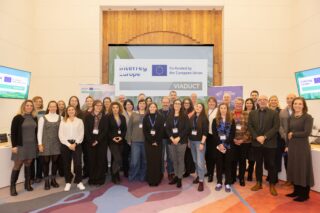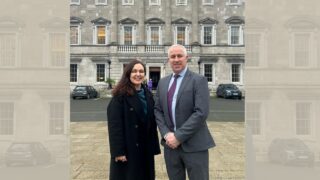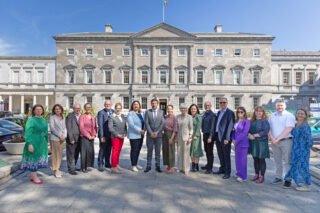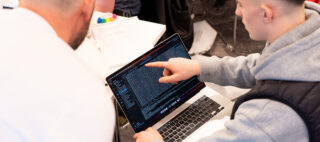The Western Development Commission (WDC) today announced an event to be held in the Aula Maxima Galway on January 22nd 2020 as part of the Blue Circular Economy project. The three-year programme is an international partnership including, amongst others the WDC, Technical University of Denmark, Norwegian University of Science and Technology, the Centre for Sustainable Design® at UCA, and the Environmental Research Institute Scotland. Its aim is to support the development of the fishing net waste recycling industry in regions across Europe and initiate a discussion with relevant West of Ireland SME’s in order to investigate existing and emerging opportunities in the sector, much of this driven by the Single use plastics directive, introduced in March 2019.
The workshop, which will be hosted by the Ryan Institute at the National University of Ireland Galway, will bring together stakeholders from a range of different sectors including those involved in the aquaculture and fisheries sector, port authorities, waste management companies, research institutes, SMEs and others involved in innovations to make new products from recycled fishing net waste as has been done in other countries in areas including clothing, textiles, garden furniture, exercise equipment, kayaks and filament inks for 3D printing.
Attendees at the workshop will hear from Alena Petrikovicova – de Chevilly, representing the European Commission’s Directorate-General for Maritime Affairs and Fisheries. Alena will provide an update on the directive surrounding single use plastics and what it will mean for the sector. Professor Martin Charter of the Centre for Sustainable Design UK will lead the workshop. He will be joined by Professor Charles Spillane, Director of NUI Galway’s Ryan Institute and Richard Glavee-Geo, Associate Professor at NTNU in Ålesund.
CEO of The Western Development Commission Tomas O’Siochan commented; “There are significant opportunities for SMEs or individuals who are looking to get involved in this sector and through projects like the Blue Circular Economy, the WDC hope to help further the impact a circular economy approach can have on a local level- both in terms of providing business opportunities and also from the positive environmental benefits that go hand in hand with the proper management of our resources. “
Over the life of the project the Blue Circular Economy aims to help develop local innovation clusters both here in Ireland and in Norway, as well as supporting SMEs looking to get started in this sector.
For further information, including how to register for the 22nd January event, please visit:
https://cfsd.org.uk/projects/bce/workshops/galway-local-innovation-systems-1/
For information on the Project visit www.bluecirculareconomy.eu
///ENDS///
For further information on the Blue Circular Economy Initiative (www.bluecirculareconomy.eu), please contact Stephen McCormack, BCE Project Officer stephenmccormack@wdc.ie or Head of Regional Development WDC Ian Brannigan ianbranniga@wdc.ie )
For further information or to arrange interviews, please contact
Allan Mulrooney, Head of Communications
allanmulrooney@wdc.ie or +353 87 334 3713
ABOUT THE WDC
- The WDC is a State agency established under statute to foster and promote the economic and social development of the Western Region (Donegal, Sligo, Leitrim, Roscommon, Mayo, Galway and Clare).
- The work of the Western Development Commissionfocuses on investment, lending, regional development and policy analysis.
- ieoffers an overview of business activity and life in the Western Region including an up to date jobs platform.
- The WDC supports regional growth through its EU projects programme
- The WDC is leading on The Atlantic Economic Corridor initiative. The AEC is an initiative to attract investment, support job creation and improve the quality of life in the West from Kerry to Donegal. This includes the Enterprise Hubs Project which is a 3-year project to create an interconnected community network from the 101 hubs identified as either operating or in development, in the AEC region.
About Blue Circular Economy.
- Established in 2018 the Blue Circular Economy is a partnership between Western Development Commission, Technical University of Denmark, Norwegian University of Science and Technology, The Centre for Sustainable Design® at UCA, and the Environmental Research Institute Scotland.
- The three year programme will promote and support companies to create sustainable industries in the recovery and recycling of used fishing netting into commercial products.
- The Blue Circular Economy project is funded by the Northern Periphery and Arctic 2014-2020 programme. Full details on bluecirculareconomy.eu
About yan Institute at NUI Galway
- The Ryan Institute focuses on four thematic research areas, namely (1) Marine & Coastal, (2) Energy & Climate Change, (3) Agriculture & Bio Economy, and (4) Environment & Health.
- The Ryan Institute is comprised of 12 Research Centers/Clusters spanning these four thematic research areas.
- The Ryan Institute is NUI Galway’s largest research institute comprised of 91 Research Groups and 12 Research Centers/Clusters that are responsible for over 350 funded research projects comprising circa. 20% of the overall research income of NUI Galway.
- The 91 Research Groups (each lead by a Ryan Institute Principal Investigator) within the Ryan Institute collectively consist of circa 470 full time researchers, including 90 Postdoctoral Fellows, 50 Research Assistants, and over 240 PhD students.
- The Ryan Institute’s 91 research groups generate over one quarter of all research publications and citations from NUI Galway.
About the Single use plastics directive
- In March 2019, the European Union passed the Single Use Plastics Directive which contains provisions for manufacture, use and disposal of fishing gear.
- Fishing gear is largely made up of different types of plastic and the next few years will require an increase in recycling of these materials which, when collected, separated, cleaned, shredded and then extruded into plastic pellets, can then go onto be used for the manufacture of new plastic products.




